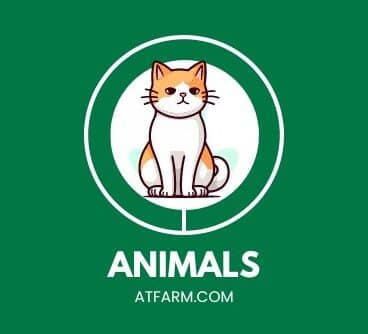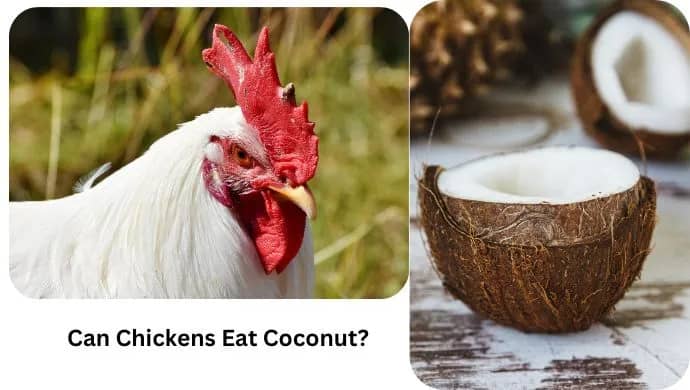Coconut is a versatile fruit that offers three major benefits for humans. First, coconut can be eaten to satisfy hunger.
Second, coconut water can be drunk to quench thirst. Third, the coconut upper shells can be used to make a fire during the winter.
However, chicken lovers always think of something else like, “Are coconuts safe for chicken to eat.”
The short and quick answer to this question is that chickens can safely eat coconut without any problems.
Although chickens are curious and often want to eat what they see their owner eating, coconut provides specific health benefits for chickens. So, give coconut to your chickens as soon as possible.
When, how, and why to feed them coconut will be discussed below.
Is it safe for chickens to eat coconut?
Although coconut is not a part of the chicken diet, this fruit can given as a treat, not as part of their regular diet. Coconut contains all the necessary nutrients that are beneficial for chicken health.
But remember that treats should always be given in moderate quantities, not as much as your chickens want to eat.
Coconuts generally grow on palm trees in tropical regions where the temperature remains between 25 to 28 degrees Celsius all year.
This means coconuts are summer fruits because they grow in warm conditions. Therefore, it is best to serve coconut to your chickens in the summer.
Although some chicken breeds have different dietary preferences and treats, if your chickens don’t want to eat coconut, don’t worry. Try offering other fruits instead.
Does coconut provide any nutrients to chickens?
Nutrients | Amount Per 85 g |
Fat | 28.5 g |
Fiber | 7.65 g |
Sugar | 5.30 g |
Water | 40 g |
Selenium | 8.6 mcg |
Protein | 2.8 g |
Coconut isn’t just a popular fruit; it’s packed with essential nutrients like calories, fats, proteins, carbohydrates, potassium, fiber, and selenium.
However, our concern is whether all these nutrients are beneficial for chicken health.
Usually, all the above nutrients are essential for birds and poultry like chickens. So, why not give coconut to chickens to provide all these nutrients in one item? Here’s a detailed look at each item:
- Calories:
Usually, chickens need up to 360 calories in winter, while in summer, they only need 260 calories per day. So, what fruit is best for providing calories to chickens?
Look no further than coconut; it is also cheaper than other fruit types. But remember that if you feed too much coconut to your chickens, it will cause obesity, and obesity is the root of many diseases.
- Fats
Generally, the major source of fats for chickens is meat. However, coconut can be an alternative to meat for chickens to obtain fats. Chickens need only 5% of fats daily, and there are 33.5 grams of fat in 100 grams of coconut. However, consuming too much fat can be harmful to chickens’ livers & can cause other diseases.
- Proteins
Chickens generally need 20% proteins from their diet to stay healthy. A 100 grams of coconut may provide 3.3 grams of protein.
- Carbohydrates
Coconut is usually low in carbs, but other nutrients are sufficient. Carbohydrates boost chicken energy. Chickens typically obtain carbohydrates from wheat or corn, but coconut can also be used to provide this nutrient.
- Fiber & Potassium
Chickens need fiber for a better digestive system, while potassium is good for baby chickens. Therefore, both nutrients are essential for chickens, and some pieces of coconut are a good source to obtain these nutrients.
- Selenium
Selenium is another nutrient that is good for chickens’ immune systems and egg production. In short, coconut contains important nutrients, including selenium, for chickens.
Is Whole Coconut Safe for Chickens?
A coconut fruit typically consists of four parts: husk, flesh, shell, and water. Husks are used for various industrial purposes rather than for eating, while the flesh, shell, and water are completely safe for chickens to eat. Here is a breakdown of each part:
- Flesh (White part): This white part or coconut meal almost contains every safe nutrient for chickens.
- Water: Coconut water, like natural water, is a good source of nutrients for chickens. It is an alternative option if your chickens don’t want to eat coconut.
- Coconut Shell; The coconut shell is dark brown in color and high in fiber, and it is also edible for chickens. You can either serve coconut meal or shell to your chickens without any problem.
Is Desiccated Coconut Good for chickens to eat?
No, absolutely not. Desiccated coconut is not safe for birds or chickens to eat. Dried coconut can cause dehydration in birds, leading to various health complications.
If you want to give coconut to your chickens, choose fresh coconut instead. While desiccated coconut can be good for humans to some extent, it is not suitable for chickens.
Due to several reasons, it is not recommended dried coconut:
- High Fat: Desiccated coconut is high in fat, which can lead to digestive problems if fed in large amounts to chickens.
- Digestive Issues: The dry coconut can be hard for chickens to digest and might cause digestive upset.
- Additives: Some artificial techniques used to dry coconut may involve harmful chemicals that are dangerous for chickens.
In short, don’t feed desiccated coconut to your pets & keep the quantity of any treat limited.
How to Serve Coconut To Chickens?
The best way to serve coconut to your chickens is to grind coconut, but do not make powder. Usually, any treat has some pros and cons & always give proper attention to chickens’ health after giving coconut.
- Use Fresh Coconut: Ensure you are using fresh coconut, not desiccated or grocery store-bought.
- Remove the Shell: Although the shell is not toxic, removing it makes the coconut easier for chickens to eat.
- Grind: Grind the coconut meat into small, manageable pieces to prevent digestive issues, but do not make it into a powder.
- Moderate Quantities: Coconut should be given as an occasional treat, not part of the daily diet. Limited quantities are best for chicken health.
- Mix with Other Foods: Combine coconut with their regular feed or other healthy treats to create a balanced diet.
- Monitor Health: Always pay attention to your chickens’ health after introducing coconut or any new treat.
FAQ:
Is fresh coconut better than desiccated coconut for chickens?
Yes, fresh coconut is preferred because desiccated coconut is high in fats and can be harder to digest.
Can coconut be part of a chicken’s daily diet?
No, coconut should not be part of the daily diet of chickens. It should be given once or twice a week.
What are the benefits of feeding coconut to chickens?
Coconut provides healthy fats, proteins, carbohydrates, potassium, fiber, and selenium, and all of these nutrients are essential for chicken.
Can baby chicks eat coconut?
No, don’t give coconut to your baby chickens, as it can be difficult for them to digest.

Hi, my name is Zubair Saeed. My education is graduation with a BSc, plus half a master’s degree. I have been writing articles about pets and animals for over a year. My second priority, after humans, is animals. Read more about me.

